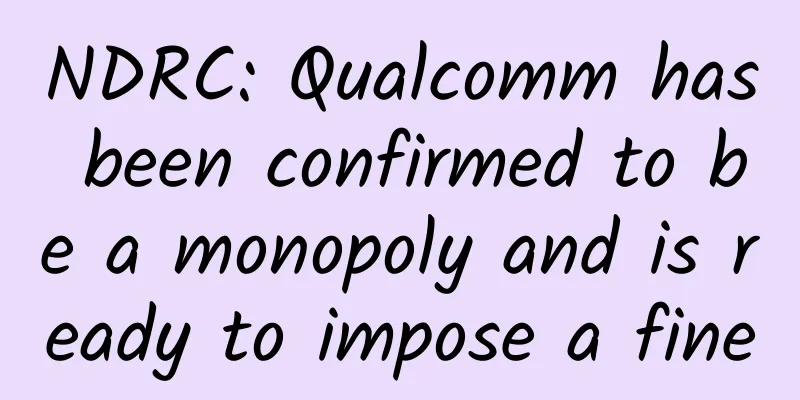NDRC: Qualcomm has been confirmed to be a monopoly and is ready to impose a fine

|
Recently, we learned from sources close to the National Development and Reform Commission that the National Development and Reform Commission has confirmed the fact that Qualcomm is a monopoly and is investigating Qualcomm's sales data from Chinese companies. On July 11, Derek Aberle, president of Qualcomm, went to the National Development and Reform Commission to exchange views on antitrust investigations and accept inquiries. This is the third time that Qualcomm's senior management has gone to the National Development and Reform Commission to accept inquiries since the National Development and Reform Commission launched an antitrust investigation into Qualcomm last year. The National Development and Reform Commission launched an antitrust investigation into Qualcomm in November last year. The National Development and Reform Commission raided Qualcomm's Beijing and Shanghai companies and investigated mobile phone manufacturers, chip manufacturers and other related companies. On February 19 this year, Xu Kunlin, director of the National Development and Reform Commission's Price Supervision and Antitrust Bureau, confirmed that the National Development and Reform Commission is investigating Qualcomm's price issues because Qualcomm is suspected of abusing wireless communication standards. "The National Development and Reform Commission attaches great importance to the antitrust investigation of Qualcomm. A total of 80 staff members have been sent, which costs a lot of money. Not only Qualcomm, but also Qualcomm's customers have been investigated, and a large amount of information has been sealed." Sources close to the National Development and Reform Commission said. A document obtained by the reporter shows that Qualcomm has a problem of excessively high licensing fees. Qualcomm's patent share in standards such as WCDMA and LTE has declined, but it still continues to charge according to the CDMA standard. Chinese IT companies actively participated in the formulation of 4G standards and obtained many core patents, but this value is not reflected in the system constructed by Qualcomm. The mainstream industry consensus on patent licensing fees is that the cumulative amount should not exceed 10% of the product price, but Qualcomm alone has reached 5%. In 2013, the average profit of Chinese mobile phone companies was less than 0.5%, but in fact, the patents held by Qualcomm are only a part of many mobile phone patents, which is obviously unfair. In 2013, Qualcomm's chip and licensing fee revenue totaled US$24.3 billion, of which nearly half came from China. Licensing business revenue accounted for 30% of total revenue, but profit accounted for 70%, twice that of chip business. It is understood that Qualcomm's cleverness is that it does not make too much money from chips, but relies on low prices to prevent competitors from getting opportunities. Relying on its monopoly in the chip market, Qualcomm can make money by bundling patents. To produce high-end mobile phones, the only way is to purchase chips from Qualcomm. In order to buy Qualcomm chips, downstream manufacturers have to agree to Qualcomm's patent fee requirements. Qualcomm has also built a cross-licensing patent platform. On the one hand, relying on cross-licensing with other patent holders, Qualcomm can provide customers with "safe" products without legal disputes. All relevant patents are integrated by Qualcomm, which can avoid patent disputes. Qualcomm chips are naturally more popular, and other chip manufacturers are difficult to match; on the other hand, Qualcomm does not pay fees to cross-licensing patent holders. Qualcomm's licensing fees for companies such as Samsung and Nokia are far lower than those for Chinese mobile phone manufacturers, which also constitutes discriminatory licensing. This is actually the result of these companies enjoying the struggle between the government and Qualcomm. In the past 10 years, Qualcomm's patent licensing model and chip sales model have been questioned in Europe, the United States, South Korea, Japan, India and other places, and antitrust and intellectual property disputes have continued. Wei Shilin, a lawyer at Dacheng Law Firm, believes that the investigation in the name of "abuse of market dominance" requires a lot of evidence to be collected, which may also be the reason why the NDRC investigation took a long time. According to relevant information, the US government attaches great importance to the antitrust investigation of Qualcomm, and the final fine may not be as high as originally estimated. However, it is reported that the National Development and Reform Commission is currently requiring several domestic companies to provide sales data since 2009 (when the Anti-Monopoly Law was implemented) to collect data for penalties. As a winner of Toutiao's Qingyun Plan and Baijiahao's Bai+ Plan, the 2019 Baidu Digital Author of the Year, the Baijiahao's Most Popular Author in the Technology Field, the 2019 Sogou Technology and Culture Author, and the 2021 Baijiahao Quarterly Influential Creator, he has won many awards, including the 2013 Sohu Best Industry Media Person, the 2015 China New Media Entrepreneurship Competition Beijing Third Place, the 2015 Guangmang Experience Award, the 2015 China New Media Entrepreneurship Competition Finals Third Place, and the 2018 Baidu Dynamic Annual Powerful Celebrity. |
<<: Why Apple Can't Replicate iPhone Success
>>: The first domestic WiFi flight experience: average internet speed per person is 2M
Recommend
Why is it that you can swat a mosquito with your hands, but it is so hard to swat a fly?
Review expert: Jiang Tao, Vice Chairman of the Sc...
Tmall responds to the fake number of reservations for Hammer smartphones: It was done by programmers
On October 12, Tmall, one of the online sales cha...
ChinaJoy is not so hot: it looks like the same old faces
The summit forum held one day before ChinaJoy (Ch...
The "Content Planning Training Camp" produced by Dangxing Academy is priced at 9999 yuan on the official website
The "Content Planning Training Camp" pr...
What are the three enemies that red fire ants fear the most? Why doesn’t the country eliminate red fire ants? Attached are the detailed reasons!
The red fire ant is a type of ant. It has strong r...
This "national treasure" can truly reproduce all earthquake activities recorded by humans!
On November 5, the national major scientific and ...
Apple Pay enters China: UnionPay’s first step in turning around mobile payments
[[129850]] The red envelope war during the Spring...
How to create a hit product through seed user operations?
Seed users generally have an open and adventurous...
Captain Da Shanzhaowan's Notes | Deep Sea Part 2
About the Mistakes of Hydrothermal Fluids During ...
[Daiyu Finance] Yan Fan Tactics Yan Style Tactics First Style Tutorial - Heaven and Earth are missing and holding a golden baby
[Daiyu Finance] Yan Fan Tactics Yan Style Tactics...
This documentary film has some background to compete with Zhang Yimou's "The Great Wall" at the box office
At the end of every year, there will be a lot of ...
Mobile phone skin comparison: Samsung loves plastic, Xiaomi loves stainless steel
[[120685]] OnePlus Technology announced that the ...
Apple opens the floodgates: Developers can now submit iOS 9 software
Not only iOS 9, but also watchOS 2 and OS X El Ca...
A short sentence of blessing for the Chinese Valentine's Day. A blessing for the Chinese Valentine's Day for your boyfriend or girlfriend or lover.
The Chinese Valentine's Day in 2020 is here. ...









